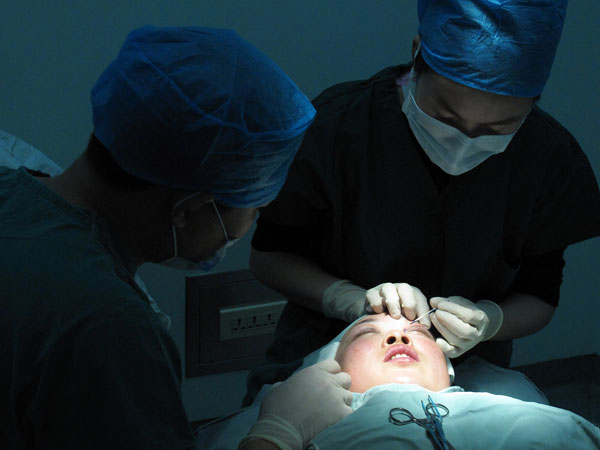Hooked on the scalpel
 |
|
Bu Ren, a facial reconstruction specialist at the Plastic Surgery Hospital under the Chinese Academy of Medical Sciences, conducts eyelid surgery. [Photo/China Daily] |
Cosmetic procedure addiction likely stems from deeper psychological issues. Liu Zhihua asks the experts.
When most people think of addiction, they think of substance abuse - not plastic surgery.
But a growing number of Chinese are discovering cosmetic procedures' potential to become habit-forming as more people in the country surgically alter their appearances.
Experts agree cosmetic surgery addiction is unhealthy but struggle to define it. It's not an officially recognized mental illness, although likely stems from diagnosable disorders, such as obsessive compulsive disorder, body dysmorphic disorder and depression.
People with obsessions with altering their appearances that seem unstoppable, even though they create significant distress and social impairment, should seek professional help, Beijing Huilongguan Hospital psychiatrist Li Binbin says.
Beijing Tongren Hospital's Plastic Surgery and Beauty Center director Zheng Yongsheng explains cosmetic procedures are more psychological than physical.
"They change self-perceived physical defects, and are personal and potentially addictive, especially to people who're never satisfied with their looks," Zheng says.
He has met many patients who want to change their lives by changing their appearances. Many get confidence boosts after surgeries and return for more.
Huang Wei, who covered the industry as a journalist in Fujian province before co-founding a private clinic in Beijing, agrees it's about confidence.
But Li, the psychiatrist, says there's more to it. The source is usually deeper underlying psychological issues.
"As with any obsessive or addictive behavior, cosmetic surgery addiction stems from distorted reasoning and perceptions of relationships," Li says.
Many patients in mental health facilities experience intense preoccupations with imagined defects in their appearances, he explains. They often blame career and relationship failures on these physical flaws.
Virtually everyone wants to be good-looking. But most don't let it rule their lives, especially if they have various sources from which to draw confidence and security, he says.
Cosmetic procedure "addicts" are often paranoid about, and preoccupied with, their appearances. They blame their life problems on perceived physical faults, Li says.
The problems often stem from personality and childhood experiences, he points out.
People with paranoid personalities, low self-esteem and feelings of insecurity are more likely to entertain obsessive thoughts and behaviors. That includes cosmetic surgery addicts, Li says.
People who fail to acquire the ability to accept the fact that loss is a part of life as children are less likely to deal with loss maturely as they age. They're likely to seek repeated cosmetic procedures to attempt to preserve youth, he explains.
Body dysmorphic disorder is a subtype of hypochondriasis, or health anxiety - a mental disorder characterized by an excessive preoccupation with, or anxiety about, serious illness based on misinterpretations of bodily symptoms.
Registration Number: 130349



























